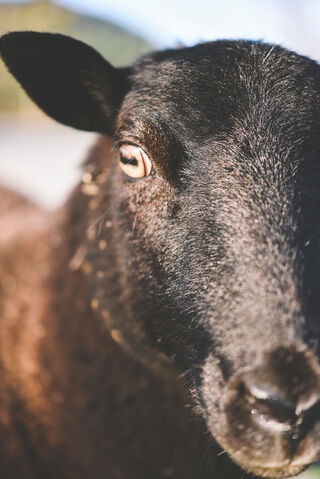Career
The Lighter and Shadowy Sides of Being the Black Sheep
Part 2: What black sheeps stand to gain from doing the psychological work.
Posted January 18, 2022 Reviewed by Gary Drevitch

This post might as well be titled, "What’s good and what’s hard about being the black sheep and what we need to do about it if we want to heal," because, as you can likely imagine, with the built-in thread of rejection and otherness that comes with embodying the “black sheep” in a family comes emotional pain.
While the pain of living out the black sheep archetype will look different for all of us, what’s likely universally true is that we all probably found ways to cope with the pain early on — ways of coping which, at one point, probably served us extremely well just to survive and make it through that experience of being rejected, misunderstood, or feeling “other.”
However, as with most psychological defenses, there’s going to come a time when our coping mechanisms, our adaptive ways of being in the world, likely stop working so well.
The “shadow side” of living out this black sheep archetype can often mean coping in ways that are maladaptive to the healthy, functional, thriving lives that we ultimately want to live.
For example, some coping mechanisms may manifest as the following:
-
Perhaps because you felt so rejected by your family of origin you walled off your heart and developed ways of keeping other people at arm’s length so you’ll never have to feel that rejection again. But now you’re struggling to form a healthy, close romantic relationship despite truly longing for one.
-
Or perhaps you learned to take comfort in food, overeating, or restricting, or binging and purging to feel “nourishment” and “control” that you didn’t otherwise feel from your family or community-of-origin and now your physical body (not to mention your health) is suffering because of it.
-
Maybe you developed a deep sense of rage and resentment because you were treated so unkindly and unfairly and this has pervaded your life and kept you in a state of chronic negativity and victimhood.
-
Perhaps, because your trust was broken early on by people who were supposed to accept and support you, you developed a hyper-inflated sense of independence instead of learning how to be interdependent with others — and you’re experiencing challenges with your coworkers, or spouse, neighbors, or girlfriends because of this.
-
Conversely, maybe because of an absence of functional, healthy parenting early on, you developed on over-dependency on others to compensate for what you originally didn’t receive, so now you struggle to be appropriately self-reliant and put too much pressure on other relationships in your life to unrealistically fulfill all your needs.
-
Maybe you feel disconnected and isolated at all levels from others and from yourself and this sense of loneliness is manifesting for you as a deep sense of sadness and depression.
These are but just a few of the ways this pain, or this “shadow side” of being the black sheep may manifest, but as with everything in life, along with a “shadow side” comes a “light side”: There is actually a tremendous amount of gift, opportunity, and power that can come with living out the “black sheep” archetype.
Specifically, I think some of the great gifts from living out this archetype can include:
- Greater physical freedom. When you feel or are rejected by your family or community of origin, there may be more freedom for you to strike out, explore the big wide world, and find your truer home — the place you want to intentionally set down roots. And without feeling “obligated” to stay within the immediate radius of your family or community of origin, you have more freedom and choice to do this.
- Increased lifestyle choice. When you aren’t beholden to your family's, church’s, or community’s expectations, you have a greater opportunity to craft the life you truly want, not just the one you’re “supposed to have.” You can more fully choose how you want to love, work, dress, worship, and nourish and build community.
- The potential for a greater and stronger sense of self. When you’re subtly or overtly rejected, you may be forced to develop more independence than your siblings or peers earlier on. This can dovetail with an increased capacity for a stronger sense of self if you’ve had to defend and assert yourself for a place in your family or community. Those who embody “the black sheep” of the family may often have more psychological “scars” than other, more accepted family members, but they may also have a greater sense of self, too.
- A greater sense of empathy and compassion for those who likewise and in their own way identify as “other.” Pain can create empathy, and empathy can create connection. I think that one of the great gifts of being “the black sheep” is the opportunity for increased empathy and compassion for so many others whom society often deems as “other.”
- A unique opportunity to find our “Wolf Pack.” When we’re rejected or misunderstood by those we come from, we have the opportunity to own and use our voice and our deep sense of self-awareness to seek out those with whom we more closely identify and resonate. These folks become our “wolf pack,” our family-of-choice, our urban family, a group that can love and cherish us in a way that our family or community of origins may simply not have the capacity to do.
These are but only a handful of examples of what we stand to gain if we’re willing to do the psychological work required for any of us who identify as The Black Sheep.


